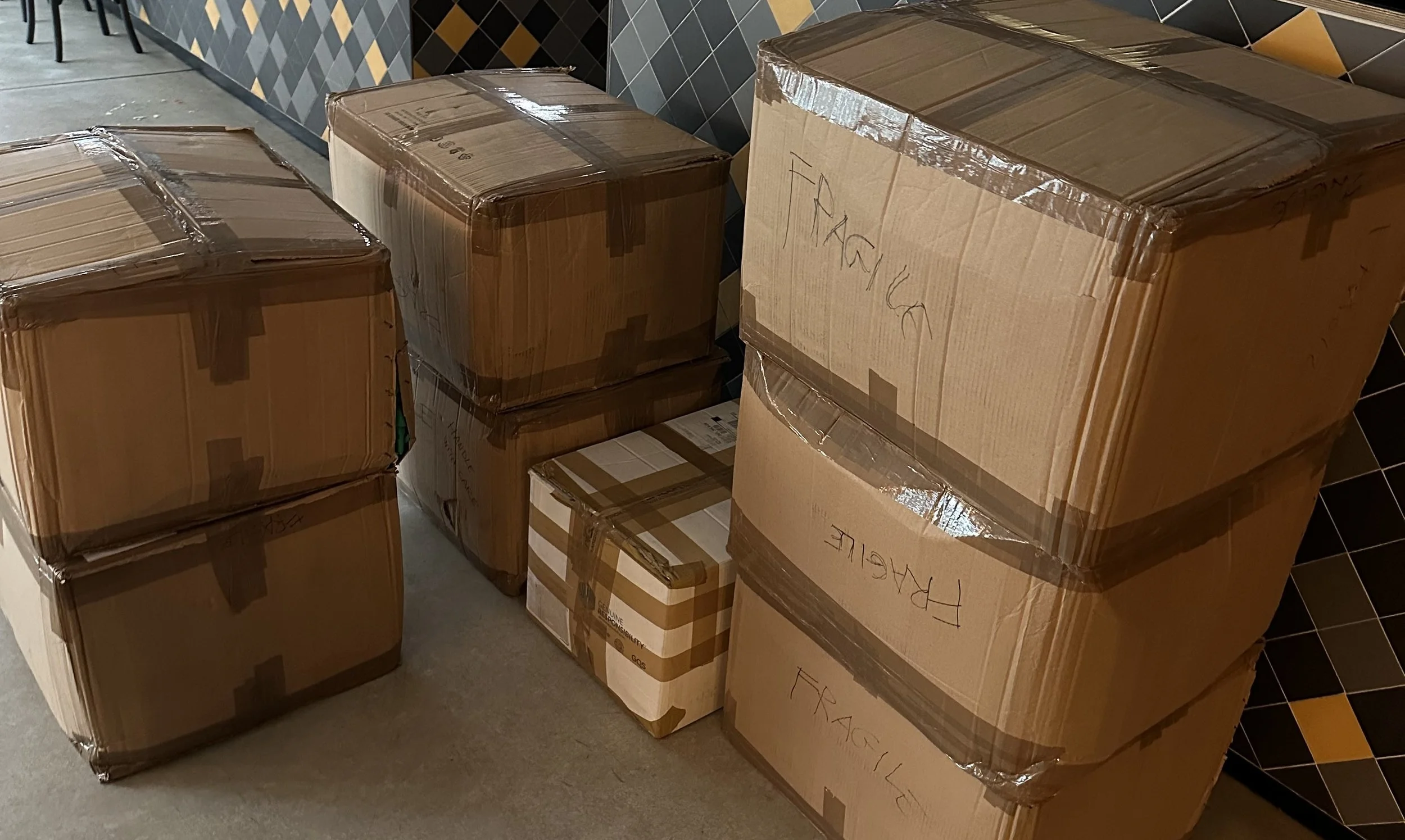Touring Merchandise in Europe Post Brexit
Since Brexit, carrying merch out of the UK in to Europe and vice versa is at least moderately more complicated than it once was.
This guide is written from my experience as a tour manager for small and mid sized tours in Europe by UK and international artists and is not intended as legal advice - It just details how I’ve seen things work in practice, and may be subject to change.
If the information contained here is worth anything to you, you can chuck me a tip here.
THE SIMPLE ANSWER:
If the manufactured value (the value you paid for the stock) of your merch is under 1000€, and you’re travelling in a vehicle under 3.5t with 9 seats or less, then you do not need to do anything at the UK border, and you can make an oral declaration at the EU border. If you’re carrying more stock, on a tour bus, or the stock is in a truck, then things get more complicated very quickly and you probably want to get your merch across the border a different way.
However, it’s worth reading and understanding the below in any case:
In almost every situation you will need to go through the process of declaring any merchandise you’re carrying before you cross the border - this includes anything you might be selling at shows.
You will need to complete either
A declaration by conduct.
A simple online declaration.
A full export declaration.
First and most important - Keep detailed records and invoices for all merchandise. This includes invoices for the purchase of the merchandise from your supplier and exact current stock quantities you’re carrying (what you had at the start less whatever you’ve sold / given away). You may need to present these documents at customs to verify the value of your merchandise.
Carnets DO NOT cover merchandise. Specifically they are for equipment that you will be carrying with you for the duration of the tour which will return to the UK. I’ve written a whole guide to using ATA Carnets for international touring HERE.
Declaration by Conduct
There is an “exception” for taking a small quantity of commercial goods out of the UK in your own vehicle. This only applies if:
You’re carrying it in your own baggage or in your own vehicle which can carry 9 people or less and weighs less than 3.5 tonnes. Thankfully this includes most tour splitter vans.
It has a value of £2500* or less. This is the manufacture value rather than the sale cost, which you should be able to prove with the invoice you received when you purchased the goods.
It weighs less than 1000kg
It is not restricted goods. This is unlikely when we’re talking about band merch, but you never know.
It’s not alcohol, tobacco or fuel. I guess it’s plausible that you have a branded beer or something, but less likely that you’ve got branded petrol.
If all of these are the case, then you can do a “declaration by conduct”. This just means you pass the customs control point without declaring or paying anything. You declare that you don’t need to declare it by not declaring it, so to speak.
If for any reason you need evidence of exporting the goods, you should do a simple online declaration instead.
*IMPORTANTLY: While the limit for taking goods in or out of the UK using a declaration by conduct, when entering the EU the rules are different.
When entering the EU you should make an oral declaration to customs officials if your goods have a value of 1000€ or less. Over 1000€ and you will need to make a full export declaration (see below).
Simple Online Declaration
If you’re taking goods out of Great Britain that:
Are accompanied by you in your baggage or in a small vehicle that can carry no more than 9 people and weighs 3.5 tonnes or less (so a car or splitter, but not a truck or tour bus).
Have a value less than £2500*. This is the manufacture value rather than the sale cost, which you should be able to prove with the invoice you received when you purchased the goods.
Weigh less than 1,000kg.
Are not restricted or controlled goods.
Are not alcohol, tobacco or fuel.
Then you can do a simple online declaration in the 5 days before you travel.
This then allows you to go through the green “Nothing to declare” channel, or simply pass through the border without needing to stop to declare anything.
You can make a simple online declaration HERE.
You will need to have obtained an EORI number (see below) at least 48 hours before travelling if you don’t have one already.
You will also need:
The name of the person carrying the goods
A description of your goods, including the total value and weight
The vehicle registration number if travelling by vehicle.
*IMPORTANTLY: While the limit for taking goods in or out of the UK using a declaration by conduct, when entering the EU the rules are different.
When entering the EU you should make an oral declaration to customs officials if your goods have a value of 1000€ or less. Over 1000€ and you will need to make a full export declaration (see below).
Full Export Declaration
If you’re a smaller artist touring Europe I would probably try to avoid this situation, but, in all other cases you will need to make a full export declaration.
Making a full export declaration requires specialist software and can be complicated. It is beyond the scope of this post, but I hope to add details of how to have one completed for you at a later date.
Differences with Northern Ireland
You do not need to declare goods when they leave Great Britain, but you will need to make a declaration in Northern Ireland.
You can do an oral declaration by going through the ‘Goods to Declare’ channel or the red phone point in the customs area to declare and make payment of what you owe if:
The value of the goods is less than £873
They weigh less than 1,000kg
They are not restricted goods
They are not alcohol, tobacco or fuel
Otherwise you will need to do a full declaration.
How to Register for an EORI number
A European Operators Registration and Identification number (EORI) is a reference number which is used if you’re moving goods for sale between Great Britain and any other country (including Northern Ireland) or between Northern Ireland and countries outside of the EU. You’ll need this number whenever you make any sort of declaration to move merchandise internationally (other than a declaration by conduct).
There are two different types of EORI number relevant here - Your number will start with either GB or XI.
GB EORI Numbers
EORI numbers that start with GB are required if you move goods to or from Great Britain.
You can apply for a GB EORI number HERE. If you’re based in the UK, you will need the following information:
Your company UTR number. You can find it here.
Your businesses start date and Standard Industrial Classification (SIC) code. You can find these via Companies House.
A Government Gateway ID and password (You can create one when you apply for the EORI number)
Your National Insurance number if you’re an individual or sole trader.
Your VAT number and effective date of registration if you’re VAT registered (You can find these on your VAT registration certificate).
If you’re not based in the UK you wont need a UTR number, SIC code or National Insurance number.
You should receive the EORI number immediately unless there are any checks required by HMRC or if you need to register for a Government Gateway ID at the same time.
XI EORI Numbers
EORI numbers that start with XI are required if you move goods to or from Northern Ireland. If you already have an EORI number from an EU country then you don’t need one starting with XI.
You must have applied for a GB EORI number before you can get an XI EORI number. Once you have your GB number, you can fill in an XI EORI registration form HERE.
You will need the following information:
Your XI VAT number, if you have one.
VAT numbers issued by any other EU countries
Two documents showing proof that your business is permanently established in Northern Ireland - I.e. bank statements of utility bills. You won’t need this if the address on your GB EORI is in Northern Ireland, or you’re not based in Northern Ireland.
You should receive your XI EORI within 5 days.
You can check the status of your application HERE
How can I get around this?
The obvious solution is just to get your merch printed in Europe, rather than carrying it over - and many merchandise suppliers will have print shops on both sides of the channel.
Obviously this still leaves an open problem of what to do with any leftover stock, but hopefully we’re talking about much smaller quantities on the return trip if you do end up needing to bring them back with you.
This also doesn’t help if you have Vinyl / CDs from a label in the UK, or existing stock that you need to take over. One option might be to ship this stock ahead of you to the first, or multiple, venues on a tour - but be aware that you may still be liable for duties on whatever you ship, and it may be held at customs for extended periods of time depending on the value.
VAT Obligations
While this post won’t cover it in depth, it’s worth understanding that you may be liable to pay VAT on sales in countries outside the UK. For a long time touring merch sales have been undertaken under the radar of tax officials - essentially avoiding tax in the countries in question - but in many counties that’s changing. An example is in Italy where at any show over a certain size you are likely to be forced to use an Italian merch concession company who will sell your merch using proper cash registers, issue VAT receipts to customers and collect and pay 22% VAT on all sales. They often charge something like 25% commission to provide that service. While this clearly sucks for the bands and musicians having their merch sold this way, it’s a product of a tax system that is catching up to tax-avoiding artists, rather than the venues being uniquely exploitative… for the most part.

